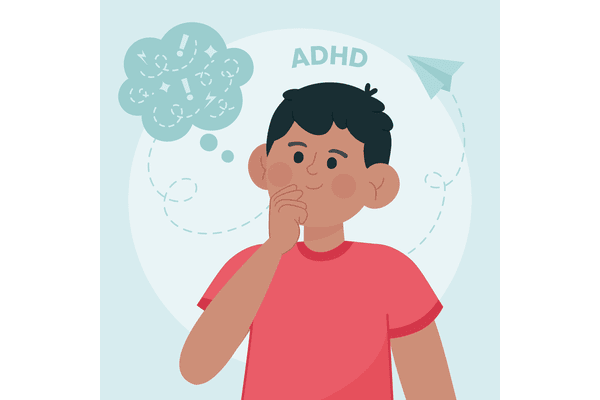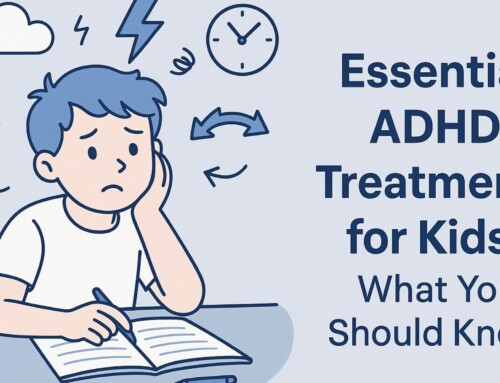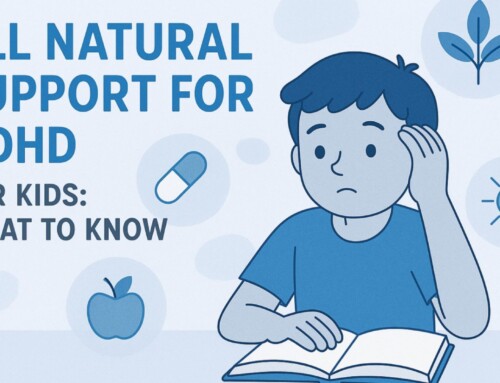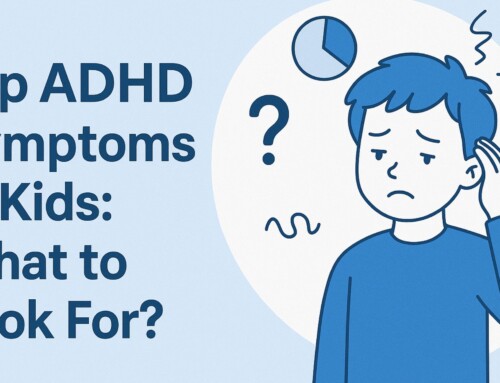Do I have ADHD, Or Am I Just Easily Distracted & Burnt Out?
TL;DR
|
|---|
If that question has been running through your mind lately, you’re not alone. Many people, especially adults, go years mislabeling their struggles as personality flaws instead of recognizing them as signs of something deeper.
ADHD (Attention-Deficit/Hyperactivity Disorder) isn’t just a childhood condition or a case of restlessness. It’s a neurodevelopmental disorder that affects how you focus, follow through, manage time, and regulate emotions. And in adults, it often hides behind procrastination, missed deadlines, and constant mental noise.
But here’s the catch: ADHD doesn’t always look the same.
Sometimes it’s loud and impulsive. Other times, it’s quiet, scattered, and overlooked. And often, it’s confused with anxiety, depression, or just “being lazy.”
This guide breaks it all down clearly- how to spot real ADHD symptoms (not just normal distraction), the different types of ADHD and how they show up in adults, and exactly how to get diagnosed if you suspect you have it.
Let’s start with what ADHD really looks like and how to know if it’s what you’re experiencing.
How Do I Know If I Have ADHD?
It’s easy to assume that ADHD means being hyperactive or, and affect your relationships, work,
Have you ever found yourself asking, “Why can’t I just stay focused?” or “Why do I always feel behind?”
If that sounds familiar, you might be wondering, how do I know if I have adult ADHD?
The only way to know for sure is through a formal evaluation by a doctor or licensed mental health professional. But there are common signs that can help you decide whether it’s worth getting checked out.
If many of these sound like you, it might be time to look deeper:
1. You Often Start Things but Rarely Finish Them
You jump into projects with excitement, but staying consistent is the real challenge. Half-done tasks pile up not because you don’t care, but because staying on track feels exhausting.
2. You Lose Track of Things Constantly
It’s not just once in a while. Keys, wallets, phones, important notes often disappear. You spend more time looking for things than actually using them.
3. You Feel Mentally Foggy Even After Resting
You’ve had a full night’s sleep, but your brain still feels like it’s running through quicksand. Focus slips away even during important conversations or tasks.
4. You Delay Even the Things You Enjoy
You love writing, gaming, or creative work, but you just don’t start. Even fun things feel hard to begin when your executive function is low.
5. You Underestimate Time All the Time
You leave home thinking you have plenty of time only to arrive ten minutes late again. Or you assume something will take “just 20 minutes,” and it eats up your whole afternoon.
6. You Drift Off During Conversations
It’s not that you’re not listening. Your mind just takes off in a different direction before you realize it. You might miss key parts of meetings or forget details instantly.
7. Everyday Decisions Feel Overwhelming
Multi-step tasks like planning a trip or organizing your day leave you frozen, thinking, Do I have adult ADHD. Even small decisions feel mentally heavy.
8. You Were Labeled Lazy as a Kid
Maybe you weren’t disruptive, so no one saw the signs. But you always felt off or behind. You may have internalized the belief that you just weren’t trying hard enough.
9. Your Emotions Spike Quickly
You can go from calm to irritated or anxious in seconds and often blame yourself afterward. Emotional reactivity feels hard to control even when you know it’s happening.
10. You Work Twice as Hard to Stay Organized
Sticky notes, alarms, planners, you try every trick, thinking, Do I have inattentive adhd. But tasks still slip through, and it takes immense effort to stay on top of your day.
What Type of ADHD Do I Have?
ADHD isn’t one-size-fits-all. In fact, there are three officially recognized types, and each presents differently. Recognizing your type can help you find the right strategies, treatments, and support.
1. Inattentive Type (Formerly “ADD”)
This type is quiet, subtle, and often overlooked, especially in women and adults. In childhood, the ratio of boys to girls diagnosed with ADHD is about 3:1, but in adulthood, it is closer to 1:1.
This shift strongly suggests that many girls and women are underdiagnosed in childhood and only receive a diagnosis later in life.
You may have Inattentive ADHD if:
- You daydream or mentally “check out” even during important tasks
- You’re often forgetful, lose things, or overlook details
- You avoid tasks that require sustained focus (like paperwork or planning)
- You’re described as “spacey,” “disorganized,” or “always in your head.”
Many adults with this type have spent years masking their struggles, developing systems, relying on last-minute pressure, or silently dealing with the emotional toll of constant self-correction.
2. Hyperactive-Impulsive Type
This is the classic, more visible version of ADHD, more common in younger children but also seen in adults.
You may have Hyperactive-Impulsive ADHD if:
- You feel an internal motor that never turns off
- You speak quickly or interrupt frequently
- You fidget, pace, or feel physically restless in calm settings
- You make impulsive choices, financial, relational, or work-related, without fully thinking them through
In adults, this can look like job-hopping, constant multitasking, or a tendency to take on too much and burn out.
3. Combined Type
Most people fall into this category, experiencing symptoms from both inattentive and hyperactive-impulsive groups.
You may have Combined Type ADHD if:
- You struggle to focus and stay still
- You often feel mentally scattered and physically restless
- You procrastinate, then rush impulsively to catch up
- You’re constantly switching between ideas, conversations, or tasks
This mix can be particularly exhausting, mentally and emotionally, and often leads people to seek help once the pressure starts affecting their quality of life.
Finding it exhausting to co-parent your special needs child? Read our solution here – Co-Parenting a Child with ADHD.
ADHD or Something Else- What are the 4 Common Misunderstandings?
Many of the symptoms of ADHD overlap with other conditions or emotional states, making it easy to misinterpret what’s actually going on.
Let’s break down the differences by looking at how these conditions affect motivation, emotional triggers, executive function, and overall thought processes.
1. Do I Have ADHD or Am I Just Lazy?
Laziness is a choice not to act when you’re fully capable. ADHD, on the other hand, often involves a genuine inability to start or follow through, even with strong intentions.
Key difference:
People with ADHD usually care deeply about their responsibilities, but feel blocked or overwhelmed by the mental steps involved. Laziness lacks this internal struggle and emotional frustration.
2. Do I Have ADHD or Anxiety?
Both ADHD and anxiety can cause restlessness, distraction, and overwhelm, but the root causes are different.
- Anxiety is driven by fear or overthinking (“What if I fail? What if something goes wrong?”)
- ADHD is driven by inconsistency of focus and impaired executive function, not fear
- People with anxiety are often over-focused; those with ADHD are under-focused, or fluctuate between the two
3. Do I Have ADHD or Autism?
ADHD and autism share traits like sensory sensitivity, trouble with routines, and social challenges, but they differ in cognitive wiring.
- Autism involves differences in social understanding, language development, and restricted interests
- ADHD centers on attention regulation, impulse control, and executive functioning
- You can have both, called co-occurring or dual diagnoses
Important: Autism often involves difficulty with interpreting social cues; ADHD often includes impulsivity in social settings.
4. Do I Have ADHD or Depression?
Depression and ADHD both affect motivation and concentration, but their emotional patterns differ.
- ADHD involves inconsistent focus and quick shifts in energy
- Depression creates a persistent low mood, fatigue, and loss of interest
- With ADHD, you may enjoy something one moment and forget it the next. With depression, joy feels flat or absent altogether
Both conditions can co-exist, but they require different therapeutic approaches.
Feel like these are resonating with what you are going through? Read more here- ADHD Therapy Tampa for Focus & Clarity- At TLC.
When to Reach Out for Help
If your symptoms are affecting your work, relationships, or self-esteem, it’s time to stop wondering and start exploring.
The earlier ADHD is identified, the easier it becomes to manage. Whether you’re experiencing inattentive episodes, emotional dysregulation, or mental fatigue that no productivity hack seems to fix, getting clarity is a step toward peace, not a label.
At Total Life Counseling, our ADHD-trained professionals can help you sort through symptoms, patterns, and possibilities. We offer compassionate, evidence-based assessments and support plans personalized for you.
You’re not lazy. You’re not broken. And you don’t have to figure it out alone.
Take the first step, book a confidential consultation with one of our ADHD specialists in Tampa today.
Conclusion
Wondering “Do I have ADHD?” isn’t just about curiosity; it’s often a signal that something deeper needs attention. Attention-Deficit/Hyperactivity Disorder (ADHD) is a real, medically recognized mental health condition that affects people of all ages, often in ways that disrupt focus, motivation, relationships, and emotional well-being.
A proper diagnosis of ADHD involves more than a quick online quiz. It requires a full assessment by a qualified mental health professional, typically using criteria from the DSM-5 (Diagnostic and Statistical Manual of Mental Disorders), a clinical standard published by the American Psychiatric Association.
If you’ve been feeling stuck, scattered, or misunderstood, it’s time to seek answers, not labels.
You deserve clarity, and the right support starts with a conversation.
Frequently Asked Questions
1. How is ADHD officially diagnosed?
ADHD is diagnosed using the criteria in the DSM-5, which outlines specific symptoms of inattention, hyperactivity, and impulsivity. A mental health professional conducts interviews, reviews history, and may use psychological tests as part of a comprehensive evaluation.
2. Is there an official ADHD test?
There’s no single blood test or brain scan to confirm ADHD. Diagnosis usually involves standardized checklists, behavior rating scales, and input from multiple sources (family, teachers, self-reports).
3. What causes ADHD?
There’s no one cause of ADHD, but research from the National Institute of Mental Health shows it likely involves a combination of genetics, brain development differences, and environmental factors. It is not caused by poor parenting, diet, or screen time alone.
4. Can diet help manage ADHD?
While not a cure, a balanced diet may support brain function and energy regulation. Omega-3s, protein-rich meals, and low sugar intake can be part of a holistic treatment plan, but should not replace clinical care.
5. Where should I start if I think I have ADHD?
Start by consulting a qualified healthcare provider or mental health professional who understands ADHD. They can guide you through a full assessment and, if needed, help develop a treatment plan that may include therapy, coaching, lifestyle changes, or medication.
Share This Story, Choose Your Platform!
Total Life Counseling Center consists of Licensed Counselors, masters level therapists, Español counselors, Licensed Mental Health Counselors, business coaches, and image enhancement coaches who provide counseling for emotional, mental, physical and spiritual care including marriage, individual, family, substance abuse and more. TLC’s family, trauma and marriage experts have been interviewed on National and Local TV/Radio over 200 times for their expert advice on Fox News, OWN, WETV, ABC’s Medical Minute and more. Our skilled counselors are relational, approachable and specialists providing therapy services in the Central Florida area including: Orlando, Winter Park, MetroWest, Windermere, Dr. Phillips, East Orlando, Lake Mary, and Clermont, Boca Raton Florida, and Dallas, TX.






